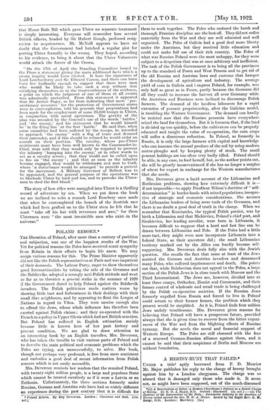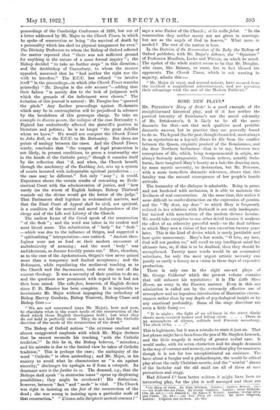A HERESY-HUNT THAT FAILED.*
UNDER a title', aptly borrowed from F. D. Maurice Mr. Major publishes his reply to the charge of heresy brought against him by a London clergyman. The charge was so absurd that it damaged only those who made it. It arose not, as might have been supposed, out of the much-discussed • ((1) d Resurrection of Relics: a Modern Churchman's Defence in a Recent Charge of Heresy. By H. D. A. Major, B.D. Oxford : Blackwell. 12,. net.]—(2) The Doctrine of the Resurrection of the Body : Documents Relating to the Question. of Heresy raised against the Bev. H. 1). d. Major. Issued by the Bight Rev. H. 11, Burge, D.D. London : Mowbray. Pa.] proceedings of the Cambridge Conference of 1920, but out of a letter addressed by Mr. Major to the Church Times, in which he spoke of resurrection as being " the survival of death by a personality which has shed its physical integument for ever." The Divinity Professors to whom the Bishop of Oxford referred
the matter reported that " there was not sufficient ground for anything in the nature of a more formal inquiry " ; the Bishop decided " to take no further steps " in this direction ; and the Archbishop of Canterbury, to whom the accuser appealed, answered that he " had neither the right nor the
wish to interfere." The E.C.U. has refused " to involve itself " in the proceedings--in which (the Church Times remarks pointedly) " Mr. Douglas is the sole accuser "—adding that their failure " is mainly due to the lack of judgment with
which the grounds of the indictment were chosen." The irritation of this journal is natural : Mr. Douglas has " queered the pitch." Any further proceedings against Modernists which may be in contemplation will be prejudiced in advance by the breakdown of this grotesque charge. To take an example in diverse genre, the collapse of the case Bottomley v. Bigland has undoubtedly affected the plaintiff's position in literature and politics ; he is no longer " the great Achilles whom we knew." We would not compare the Church Times to John Bull, or the E.C.U. to Mr. Bottomley. But there are points of analogy between the cases. And the Church Times, wisely, concludes that " the weapon of legal prosecution is not likely, in present conditions, to prove a trustworthy one in the hands of the Catholic party," though it consoles itself by the reflection that " if, and when, the Church herself, through the machinery of the Enabling Act, sets up a system of courts invested with indisputable spiritual jurisdiction . . . the case may be different." Not only " may " ; it would.
Experience shows the certain results of entrusting an Eccle- siastical Court with the administration of justice, and " how surely (as the wisest of English bishops, Bishop Thirlwall reminds us) the divine would get the better of the judge."
That Parliament shall legislate in ecclesiastical matters, and that the Final Court of Appeal shall be civil, not spiritual, is a condition of the mental and moral independence of the clergy and of the Life and Liberty of the Church.
The earliest forms of the Creed speak of the resurrection " of the flesh " ; and the word was taken in its crudest and most literal sense. The substitution of " body " for " flesh " —which was due to the influence of Origen, and suggested a " spiritualizing " interpretation—was resisted. " Ancient theo- logians were not so fond as their modem successors of ambidexterity of meaning ; and the word ' body ' was ambidextrous, as Jerome forcibly points out." Here, therefore, as in the case of the Apokatastasis, Origen's view never gained more than a temporary and limited acceptance ; and the Reformers, while repudiating the mediaeval teaching as to the Church and the Sacraments, took over the rest of the current theology. It was a necessity of their position to do so; and the questions now prominent with regard to it had not then been raised. The volte-face, however, of English divines since F. D. Maurice has been complete. It is impossible to incriminate Mr. Major without impugning the orthodoxy of Bishop Harvey Goodwin, Bishop Westcott, Bishop Chase and Bishop Gore :-
" We are not concerned (says Mr. Major), here and now, to elucidate what is the exact mode of the resurrection of the dead which these English theologians hold ; but what they do not hold is perfectly clear. They do not hold the Catholic doctrine of the mode of the resurrection of the dead."
The Bishop of Oxford notices "the extreme candour and almost exaggerated emphasis with which Mr. Major declares that he cannot reconcile his teaching ` with the Catholic tradition.•" In this he is, the Bishop believes, " mistaken ; and his mistake is due to the limited view he takes of Catholic tradition." This is perhaps the case ; the ambiguity of the word " Catholic " is often misleading ; and Mr. Major, in his anxiety to avoid what he characterizes as " a sin against sincerity," discharges his apologia as if from a catapult. Its dominant note is the fortiter in re. The demand, e.g., that the Bishops shall speak " in stentorian tones " opens up displeasing
possibilities ; they might be overheard r` His distinction, however, between " fact " and " mode " is vital. " The Church was right in insisting on the fact of the resurrection of the dead ; she was wrong in insisting upon a particular mode of that resurrection." " Utinam soils Scripturis contenti essemus 1 "
says a wise Father of the Church ; et Hs nulla *bat " In the resurrection they neither marry nor are given in marriage, but are as the angels of God in heaven." What more is needed ? The root of the matter is here.
In the Doctrine of the Resurrection of the Body the Bishop of Oxford publishes, with Mr. Major's defence, the " Opinions " of Professors Headlam, Locke and Watson, on which he acted. The upshot of the whole matter seems to be that Mr. Douglas, who came, like Balaam, to curse, has in fact blessed his opponents. The Church Times, which is not wanting in sagacity, admits this :- " Mr. Major (it says), and several minors, have secured from the incident a magnificent advertisement, and are pursuing their advantage with tho zest of the Modem Publicist."



































 Previous page
Previous page